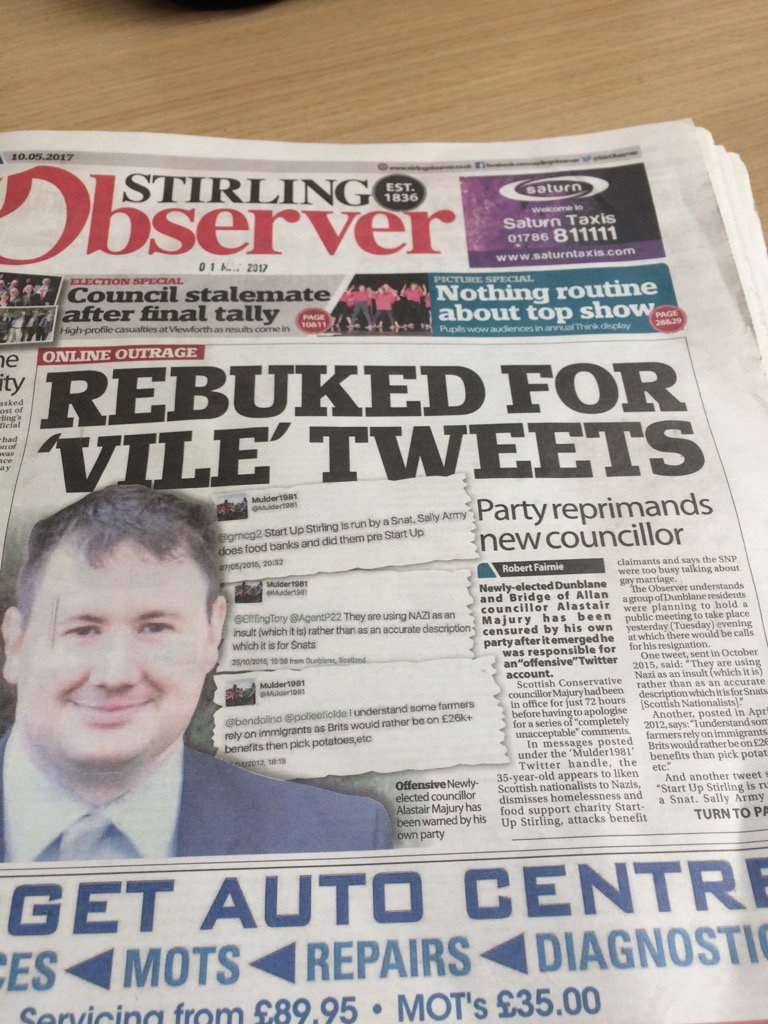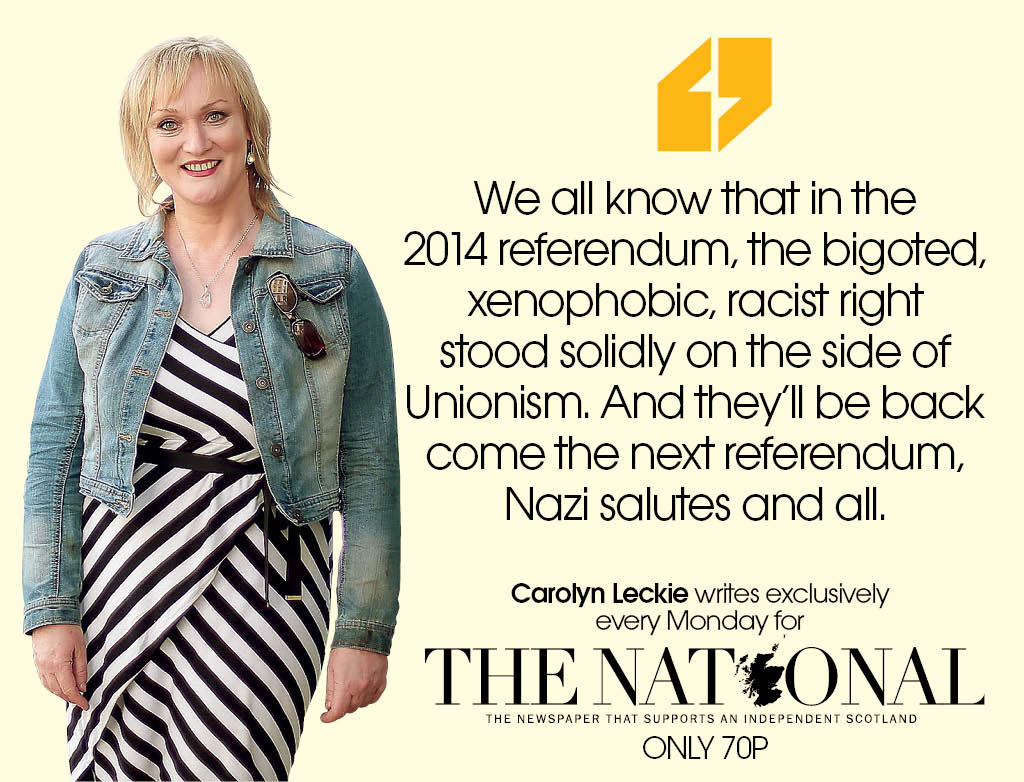On Nationalism


The furore over the First Minister’s comments about nationalism are hugely over-played. It’s the silly season and bored journos are looking to fill pages.
The rank hypocrisy of a political party led by a woman who dresses up in khaki and likes to pose on top of tanks, and whose own party has just unleashed the most remarkable and damaging onslaught of Anglo-British nationalism lecturing anyone is amusing. Less so perhaps that the same party has just allowed Alastair Majury to rejoin his party after being exposed as a serial abuser of social media (‘Tory councillors return to fold after ‘offensive tweets”). In messages posted under the ‘Mulder1981’ Twitter handle, the Majury likened Scottish nationalists to Nazis, dismisses homelessness and food support charity Start- Up Stirling, attacks benefit claimants and says the SNP were too busy talking about gay marriage. In 2013, Davies posted a series of tweets captioning a picture of black people waiting to board a cargo plane. One such tweet read: “In the interests of security keep your loin cloths with you at all times. Spears go in the overhead locker.”
So far so Spanner.
It perhaps shouldn’t come as any great surprise from a party that has driven and popularised racism for decades and gorged themselves on nationalist grievance to push through the Brexit campaign.
But for Conservative and Unionists this is simply to be ignored.
David Torrance tried another run at his O’Hagan article, arguing:
“But even the relatively benign variety is still nationalism, and that remains problematic even when shorn of racial or other sorts of prejudice. As Michael Ignatieff also noted, all forms of nationalism “vest political sovereignty in the ‘the people’”, a belief that it is the nation “which provides them with their primary form of belonging”. That view is obviously contestable, for it’s not clear why nationhood should be more important than other aspects of human identity like class or religion.”
To which you could answer simply that is because “people live in places” and want to elect their own governments.
In this sense the Yes movement is more of a democracy movement than a nationalist one.
Nobody believes Scots are better than anyone else – just that we are as good as anyone else.
These very simple modest claims: that we should be able to elect our own governments, and that we are as good as anyone else, causes apoplexy in Unionists.
For the Unionist British Nationalism doesn’t and cannot exist and the effort to smear, denigrate or ridicule Scottish nationalists is more than a pastime, its an obsession. It does however result in them looking more and more desperate. For Torrance and Davidson’s account of Scottish nationalism has to do two things simultaneously. Never mind Andrew O’Hagan. First it has to shy away from the reality that the Yes movement encompasses such bloodthirsty right-wing nationalists as Tommy Sheppard and Lesley Riddoch, James Kelman and Val McDermid, AL Kennedy and Alan Warner. They have to convince us that Janice Galloway and Kathleen Jamie are wrapped in the Saltire and daubed in wode and that Humza Yousaf is a secret agent for Siol nan Gaidheal. Second it has to both avert its gaze from the terms of the popular vote in 2014 which was deliberately (and proudly) based on residency rather than ethnicity, and also ignore the huge Remain vote that Scotland gave in the Brexit referendum.
In addition they have to ignore the rampant – and often violent elements of extreme British Nationalism that support their cause. This is difficult to sustain as the empire state of mind bubbles over and froths up as the remnants of a failed economy and a society distorted by inequality simmer in bitterness.
Further they have to ignore history.
They have to forget the Committee of 100, Burns, the 1820 Uprising or Thomas Muir.
In short after the Brexit campaign, and witnessing English political culture dissolve into an exhibition of self-parody, the jibes about ‘Nationalism’ offered up by Conservatives are just a bloody cheek.
Ruth Davidson writes in the Telegraph: “Every now and then, someone in politics commits such an outrageous act of self-deception, the casual reader has to double-take to ensure they’ve fully understood. Not just spin or nuance, chutzpah or guile, but a proper, all-out piece of perfidy of the black-is-white variety that would make even Pinnochio blush.”
For Davidson, as part of a government who issued the Hate Van and now we’re told by the Observer (‘Home Office used charity data map to deport rough sleepers’) secretly acquired sensitive data, showing the nationality of people sleeping rough on the streets, in order to remove them from Britain, to write with such contempt is beyond blinkered and hypocritical, it is astonishing and embarrassing.
Torrance tries to attach the SNP to Serbia and the Balkan conflicts, and assigns the notion of ‘civic nationalism’ to Michael Igantieff’s 1993 book “Blood and Belonging: Journeys into the New Nationalism”.
A more credible analysis comes from Tom Nairn, reviewing Stephen Maxwell’s ‘The Case for Left-Wing Nationalism’ he writes:
“Yes” is about the conditions required for such advance, which can’t be ‘cultural’ or emerge from civil society alone. Scots invented ‘civil society’ in the 19th century as an alternative to the loss of statehood, but in the 21st century it’s no longer sufficient. The prolonged recession between 2008 and the present has underlined the need for more political diversity, for new ways to tackle a ‘cosmopolitan’ capitalism no longer able to guarantee reasonable development and prosperity. Of course independence ‘by itself’ won’t generate miracles; but the point is, surely, that no society is any longer ‘on its own’, and will only be able to contribute to a broader ‘Common Weal’ with the means to act, experiment, and be different. Independence was never a sufficient condition of societal success; but does it not remain a necessary condition of tolerable change and bearable identity?
The remarkable feature of the democracy movement in Scotland has been its peacefulness, calm and patience. One of the – often derided – features of the Yes movement was the spontaneous outburst of cultural activity. One of the defining features of the movement has been the huge growth of poetry in spoken and written form. This phenomena is difficult to explain alongside the picture of brute nationalism painted by Davidson and Torrance this week.
Here’s a poem made up of responses to Kathleen Jamie a few days before the vote. She emailed a dozen friends and asked for a snap response to the question “Where are we at?” Their replies make up the poem:
Aye!
We are rolling our tongues around a 3 letter word.
We are finding our voice.
We’re resisting the big-bank, multinational-dictated slippage to the Right …
Only bruising, no blood.
It’s about money.
It’s not about money.
It isn’t all about money.
It’s about fear, faith, strength.
It can’t come fast enough.
We’re exploring a different way of organising a country.
This won’t go back in the box.
We’re questioning everything.
Peacefully,
we’re resisting all sorts of intimidation from the British establishment
England has been a good neighbour, but …
It’s the choice between a maimed culture and a whole country.
Unionism has no new songs.
What a great time to be alive in Scotland!
We’re one-thirds way round a big blind bend.
‘Unionism has no new songs’. The pity for those who want to smear a movement which asked ‘what kind of country do you want to live in?’ is that they end up reflecting back on themselves.
*

We’ve got big plans to launch our new site, to launch new publishing and events projects, and to extend our platform of writers – but all of this needs your support.
Bella Caledonia remains free (and ad-free) and takes me hundreds of hours a month to research, write, commission and edit. If you value what I do, please consider supporting with a recurring monthly donation of your choosing. GoCardless to set up a small monthly donation to support independent journalism in Scotland.
Thanks!
*
Go here to subscribe for free and get each Bella article sent to your email
Go here to follow us on Twitter @bellacaledonia
Go here to follow us on Instagram
Go here to join our Facebook Group
Go here to follow us on Spotify
Go here to write for us




The Tories just trying to divert attention from their pact with the DUP and what secret terms were agreed to allow them to remain in government.
To xenophobia we can now add religious,ethnic and homophobic bigotry.
Who needs rampant “nationalism” when you can have the Nasty party with all it’s attendant intolerance.
This is what unionists on both sides of the water appear to think we should be aspiring to as a “nation”.
Not in my name.
What is Brexit about if it’s not about English nationalism? In fact it’s about English superiority, and a minority of Scots who accept that superiority without question.
Twenty-first century Scottish nationalism is so evidently nothing like the ethnic nationalism that Torrance, Davidson, Alistair Darling, Douglas Alexander, Gordon Brown, Jeremy “you can’t eat a flag” Corbyn, and the rest want to link it to. You just have to hear anyone on the Yes side arguing for more immigration to Scotland understand that.
The most depressing group here is the Labour Party lot – you might think they would be enlightened and philosophically subtle enough to manage the idea that one can be both attached to a particular nation and an internationalist. But as Anthony Barnett suggests in his new book Lure of Greatness, Labour has only ever known the Empire State of Britain. Britain is its term of reference, and it can’t think other than that Britain is the great union to which we must all belong in solidarity.
It is useless despairing at the self-evident loathing for their country/countrymen espoused by Torrance , Davidson et al ..it is deeply ingrained .
They are the complete antithesis of the ‘Wha’s like us ? ‘ attitude that we Scots are often accused of exhibiting . They would have the Saltire replaced by the Scottish Cringe as the national flag – a kneeling figure with its hands outstretched begging at the feet of an aristocratic figure draped in the Union Flag , flanked by two tartan-clad Trident Missiles .
The central fact is that Nicola Sturgeon chose to say that she is uncomfortable with the word ‘national’ in the name of the SNP.
Her comment strikes me as demonstrating a lack of political intelligence.
All previous party leaders and – as far as I can tell – the vast majority of members and voters- have no problem with the name.
Why then bring it up ? The answer is that Nicola Sturgeon comes from a leftist political culture where nationalism is regarded, axiomatically, as bad. This leads her to defend her ‘good nationalism’ against others’ ‘bad nationalism’.
It would be simpler and more accurate to say that nationalism is itself healthy but that extreme nationalism is not.
Nicola Sturgeon did not bring it up , she was told by a Turkish commentator at the book festival in Edinburgh that ” nationalist ” had a very different meaning to her understanding of the word compared to what the SNP stood for . This is when Nicola Sturgeon agreed that the word is perhaps not one she would use if she could go back to the naming of the party .
I did not suggest that she brought the topic up.
I do say that the manner of her response created a stick for opponents to use against her.
If it wasn’t that stick it would be snother one. For what it’s worth, I agree with Nicola. Nationalism has acquired s lot of baggage over the years. Were it possible, I would prefer the Scottish Independence Party, the Scottish Democratic Partyor even ( a bit of a mouthful, admittedly ) the Scottish Self Governance Party.
It might be a good media tactic to go the simple route, as you suggest. But the more difficult truth is that the goodness/badness of a nationalism depends on its historical circumstances. For example, I would think it was good to be an Estonian nationalist in the Brezhnev-era USSR, or an Indian nationalist during the age of the British Empire. Being an American nationalist now is a doubtful business, though it wasn’t in the 1760s.
Davidson, Torrance and the rest need to put away their copies of George Orwell’s essay and pick up more complex and historically wider views (Ernest Gellner, Benedict Anderson, Tom Nairn would be a good start). The case for Scottish and Welsh nationalisms is being made by the present performance of the UK state – highlighted now with Brexit.
I think we should just called them the Dependence Parties.
Agree it is the silly season, and there is no particular benefit in changing the name, parties are known by their shorthand anyway – SNP, Lib Dems, Tories.
In the context of that particular audience, the name might have seemed jarring. Countries tend not to have national political parties with the name of the country or people in the title, the exceptions mostly being right-wing or populist parties (True Finns, Danish People’s Party, UKIP, etc., though we’ve also has the Scottish Socialists). In an independent Scotland, being called Scottish or nationalist would be redundant, and you could expect a name change – though I doubt it would completely split apart and disappear as we once believed.
I’d say the Growth Commission report is more of a concern. If it has been finished and delivered, but the SNP refuses to publish it, then it will be a stick to beat the Scottish Government any time indy2 is floated (“either the Commission has no answers or they are so bad they can’t be made public”), a kind of McCrone report for the 21st century. But then the SNP leadership may be switching to a long-game on indy and wait out BREXIT before setting a new course, in which case the Growth Commission could be seen to have been overtaken by events.
I buy and read most of The Herald each day. One column I always ignore is David Torrence’s. He only writes SNP Bad stuff.
Our problem is not individual unionists but the coverage they get in the unionist media. My wife reads the Daily Express, despite the nonsense it spews out every day – examples above. Almost every organ in public media sings the same song, based on the interests of their right wing owners who, in turn, hire right wing and fascist editors.
The anti-independence tropes of the 2014 referendum, the 1997 one and the 1979 are continually reheated and repeated and will be forever: too wee, no’ very good, customs posts at the border, can’t use the pond. deeply in debt, antiEnglish etc. etc.
They are designed to shore up the pro-union vote.
It is subliminal ‘advertising’ and it can influence the decisions of people who are not particularly interested in politics and, such people, who are as intelligent as the rest of us are not interested in politics because of the posturing, cavilling contortions of the ridiculous political and media class.
Most political names are misleading, yes even fake:
Conservative – aye, holding traditional values all right, i.e. right wing fascism, looking after the privileged few, sowing disorder wherever they can, incompetent and hardly ‘conservative’ with taxpayer money especially when it comes to vanity projects, wars, private monopolies, offshore tax havens etc
Labour – infiltration by Tory mindsets/Blairism and controlled by Tory civil servants when in ‘power’ has ensured they are less interested in the working man/woman, and rather too like the Tories, hence the term ‘red’ Tories
Liberal-Democrat – they are neither
Scottish National Party – well, any nationalist worth the name would have used their majority of Scotland’s democratically elected MP’s to give notice to end the union by now and headed for te UN. They are not ‘nationalists’, indeed many of them are rather recent ‘unionists’, who appear to be jumping on a successful party bandwagon. They are ‘civic nationalists’ with a wee ‘n’, happy to ‘manage’ the wee devolved colonial setup at Holyrood on behalf of the ‘administrative Power’ across the ‘border’ until the ‘time is right’, maybe, sometime in the future, whenever, and most probably after many of them spend virtually a lifetimes career taking the colonial salary.
Unionist – the brexit/supreme court decision (and a succession of breaches of the Treaty of Union) confirmed there is no union, which appears to be the longest constitutional con trick in the history of colonisation.
They are all fakes – nothing is real – leading us all on a Magical Mystery Tour to a nostalgic nowhere.
That’s some swamp, Alf! Have you come up with a plan for draining it yet?
I am beginning to think Scotland may be beyond help, Graeme.
You’re rapidly becoming the Jim MacLean of the yes movement, Alf. For the sake of your health cheer up. We’ll get there. Then you’ll have to manage Dundee United to find something to complain about. Or take the Scotland job.